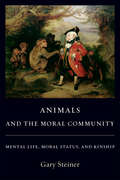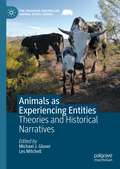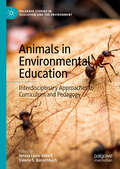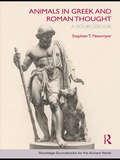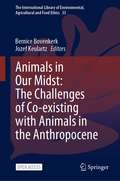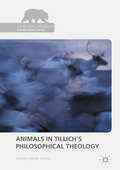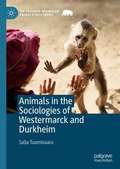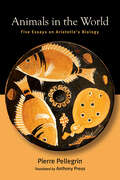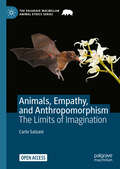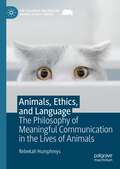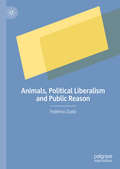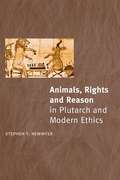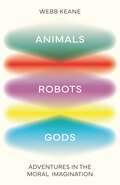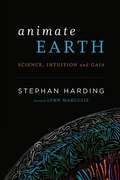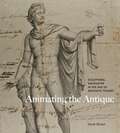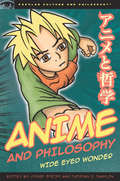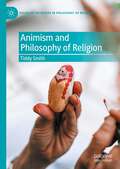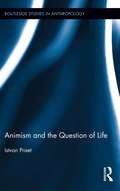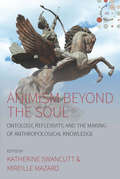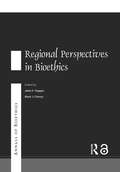- Table View
- List View
Animals and the Limits of Postmodernism (Critical Perspectives on Animals: Theory, Culture, Science, and Law)
by Gary SteinerIn Animals and the Limits of Postmodernism, Gary Steiner illuminates postmodernism's inability to produce viable ethical and political principles. Ethics requires notions of self, agency, and value that are not available to postmodernists. Thus, much of what is published under the rubric of postmodernist theory lacks a proper basis for a systematic engagement with ethics. Steiner demonstrates this through a provocative critique of postmodernist approaches to the moral status of animals, set against the background of a broader indictment of postmodernism's failure to establish clear principles for action. He revisits the ideas of Derrida, Foucault, Nietzsche, and Heidegger, together with recent work by their American interpreters, and shows that the basic terms of postmodern thought are incompatible with definitive claims about the moral status of animals—as well as humans. Steiner also identifies the failures of liberal humanist thought in regards to this same moral dilemma, and he encourages a rethinking of humanist ideas in a way that avoids the anthropocentric limitations of traditional humanist thought. Drawing on the achievements of the Stoics and Kant, he builds on his earlier ideas of cosmic holism and non-anthropocentric cosmopolitanism to arrive at a more concrete foundation for animal rights.
Animals and the Moral Community: Mental Life, Moral Status, and Kinship
by Gary SteinerGary Steiner argues that ethologists and philosophers in the analytic and continental traditions have largely failed to advance an adequate explanation of animal behavior. Critically engaging the positions of Marc Hauser, Daniel Dennett, Donald Davidson, John Searle, Martin Heidegger, and Hans-Georg Gadamer, among others, Steiner shows how the Western philosophical tradition has forced animals into human experiential categories in order to make sense of their cognitive abilities and moral status and how desperately we need a new approach to animal rights. <P><P>Steiner rejects the traditional assumption that a lack of formal rationality confers an inferior moral status on animals vis-à-vis human beings. Instead, he offers an associationist view of animal cognition in which animals grasp and adapt to their environments without employing concepts or intentionality. Steiner challenges the standard assumption of liberal individualism according to which humans have no obligations of justice toward animals. Instead, he advocates a "cosmic holism" that attributes a moral status to animals equivalent to that of people. Arguing for a relationship of justice between humans and nature, Steiner emphasizes our kinship with animals and the fundamental moral obligations entailed by this kinship.
Animals as Experiencing Entities: Theories and Historical Narratives (The Palgrave Macmillan Animal Ethics Series)
by Les Mitchell Michael J. GloverThis volume explores the experiences of those with little or no power—usually, although not exclusively, animals. The theme of animals as experiencing entities is what links the chapters and characterises the volume. Broadly each author in this volume contributes in one of two ways. The first group, in Section 1, theoretically engages animal subjectivity, animal experiences, and ways in which these are to some extent accessible and knowable to humans. The second group of authors, in Section 2, offer narrative accounts about specific animals or groups of animals and explore to some extent their subjective historical experiences. In summary, the first section diversely theorises about animal experiences, while the second section’s authors assume animals’ subjective experiences and construct narratives that take into account how animals might have subjectively experienced historical phenomena.
Animals as Persons: Essays on the Abolition of Animal Exploitation (Critical Perspectives On Animals Ser.)
by Gary FrancioneA prominent and respected philosopher of animal rights law and ethical theory, Gary L. Francione is known for his criticism of animal welfare laws and regulations, his abolitionist theory of animal rights, and his promotion of veganism and nonviolence as the baseline principles of the abolitionist movement. <P><P> In this collection, Francione advances the most radical theory of animal rights to date. Unlike Peter Singer, Francione maintains that we cannot morally justify using animals under any circumstances, and unlike Tom Regan, Francione's theory applies to all sentient beings, not only to those who have more sophisticated cognitive abilities.
Animals in Environmental Education: Interdisciplinary Approaches to Curriculum and Pedagogy (Palgrave Studies in Education and the Environment)
by Teresa Lloro-Bidart Valerie S. BanschbachThis book explores interdisciplinary approaches to animal-focused curriculum and pedagogy in environmental education, with an emphasis on integrating methods from the arts, humanities, and natural and social sciences. Each chapter, whether addressing curriculum, pedagogy, or both, engages with the extant literature in environmental education and other relevant fields to consider how interdisciplinary curricular and pedagogical practices shed new light on our understandings of and ethical/moral obligations to animals. Embracing theories like intersectionality, posthumanism, Indigenous cosmologies, and significant life experiences, and considering topics such as equine training, meat consumption and production, urban human-animal relationships, and zoos and aquariums, the chapters collectively contribute to the field by foregrounding the lives of animals. The volume purposefully steps forward from the historical marginalization of animals in educational research and practice.
Animals in Greek and Roman Thought: A Sourcebook (Routledge Sourcebooks for the Ancient World)
by Stephen T. NewmyerAlthough reasoned discourse on human-animal relations is often considered a late twentieth-century phenomenon, ethical debate over animals and how humans should treat them can be traced back to the philosophers and literati of the classical world. From Stoic assertions that humans owe nothing to animals that are intellectually foreign to them, to Plutarch's impassioned arguments for animals as sentient and rational beings, it is clear that modern debate owes much to Greco-Roman thought. Animals in Greek and Roman Thought brings together new translations of classical passages which contributed to ancient debate on the nature of animals and their relationship to human beings. The selections chosen come primarily from philosophical and natural historical works, as well as religious, poetic and biographical works. The questions discussed include: Do animals differ from humans intellectually? Were animals created for the use of humankind? Should animals be used for food, sport, or sacrifice? Can animals be our friends? The selections are arranged thematically and, within themes, chronologically. A commentary precedes each excerpt, transliterations of Greek and Latin technical terms are provided, and each entry includes bibliographic suggestions for further reading.
Animals in Our Midst: The Challenges of Co-existing with Animals in the Anthropocene (The International Library of Environmental, Agricultural and Food Ethics #33)
by Bernice Bovenkerk Jozef KeulartzThis Open Access book brings together authoritative voices in animal and environmental ethics, who address the many different facets of changing human-animal relationships in the Anthropocene. As we are living in complex times, the issue of how to establish meaningful relationships with other animals under Anthropocene conditions needs to be approached from a multitude of angles. This book offers the reader insight into the different discussions that exist around the topics of how we should understand animal agency, how we could take animal agency seriously in farms, urban areas and the wild, and what technologies are appropriate and morally desirable to use regarding animals. This book is of interest to both animal studies scholars and environmental ethics scholars, as well as to practitioners working with animals, such as wildlife managers, zookeepers, and conservation biologists.
Animals in Tillich's Philosophical Theology (The Palgrave Macmillan Animal Ethics Series)
by Abbey-Anne SmithThis book explores how Paul Tillich’s systematic theology, focusing on the concepts of being and reason can benefit nonhuman animals, while also analysing how taking proper account of nonhuman animals can prove immensely beneficial. The author first explains the body of Tillich’s system, examining reason and revelation, life and the spirit, and history and the kingdom of God. The second section undertakes a critical analysis of Tillichian concepts and their adequacy in relation to nonhuman animals, addressing topics such as Tillich’s concept of ‘technical reason’ and the multidimensional unity of life. The author concludes by discussing the positive concepts in Tillich’s systematic theology with respect to nonhuman animals and creation, including the concept of universal salvation and Tillich’s interpretation of nonhuman animals and the Fall in Genesis.
Animals in the Sociologies of Westermarck and Durkheim (The Palgrave Macmillan Animal Ethics Series)
by Salla TuomivaaraThis book explores why animals, at some point, disappeared from the realm and scope of sociology. The role of sociology in the construction of a science of the ‘human’ has been substantial, building representations of the human sphere of life as unique. Within the sociological tradition however, animals have often been invisible, even non-existent. Through in-depth comparisons of the texts of prominent early sociologists Emile Durkheim and Edward Westermarck, Tuomivaara shows that despite this exclusion, representations of animals and human-animal relations were far more varied in early works than in the later sociological cannon. Addressing a significant gap in the interdisciplinary field of animal studies, Tuomivaara presents a close reading of the historical treatment of animals in the works of Durkheim and Westermarck to determine how the human-animal boundary was established in sociological theory. The diverse forms in which animals and ‘the animal’ appear in the works of early classical sociology are charted and explored, alongside the sociological themes that bring animals into these texts. Situated in contemporary theory, from critical animal studies to posthumanism, this important book lays the groundwork for a disciplinary shift away from this sharp human-animal dualism.
Animals in the World: Five Essays on Aristotle's Biology (SUNY series in Ancient Greek Philosophy)
by Pierre PellegrinIn Animals in the World, renowned Aristotle scholar Pierre Pellegrin attempts to demonstrate that Aristotle, by proposing an original version of natural perfection, opposes the whole of the Greek tradition. Nature is perfect, not only in its harmony of a complete and well-organized whole, but also because it brings together functionally perfect individuals.
Animals, Empathy, and Anthropomorphism: The Limits of Imagination (The Palgrave Macmillan Animal Ethics Series)
by Carlo SalzaniThis open access book explores the role of imagination in animal ethics and its constitutive links to empathy/sympathy and anthropomorphism. The book argues for the constitutive role of imagination in ethical deliberation, but acknowledges that there exist important limits to its use. However, &“limit&” is here understood not merely negatively as restriction and insufficiency, but rather positively as &“condition of possibility,&” so what the book explores and analyses are the conditions for a positive and fruitful use of the imagination in ethics. The book uses as a &“frame&” the questions and issues raised in J.M. Coetzee&’s The Lives of Animals to explore some central and salient themes.
Animals, Ethics, and Language: The Philosophy of Meaningful Communication in the Lives of Animals (The Palgrave Macmillan Animal Ethics Series)
by Rebekah HumphreysWith an ever-growing body of evidence on the links between different oppressions, never have the debates in Critical Animal Studies surrounding intersectionality in relation to animal ethics been more important. In particular, the arguments related to anthropomorphic attributes of mentality to other than humans promise to provide fruitful new ground for re-assessing human-animal relations. This book maps the central debates surrounding anthropomorphism in relation to our descriptions of animals, their lives, animal mentality, and meaningful communication in the nonhuman world. Rebekah Humphreys synthesizes the work of critical animal theorists, philosophers, and cognitive ethologists, and provides a critical account of how the debates concerning anthropomorphism play a key role in a proper understanding of animal ethics.
Animals, Political Liberalism and Public Reason
by Federico ZuoloThis book explores the problem of disagreement concerning the treatment of animals in a liberal society. Current laws include an unprecedented concern for animal welfare, yet disagreement remains pervasive. This issue has so far been neglected both in political philosophy and animal ethics. Although starting from disagreement has been the hallmark of many politically liberal theories, none have been devoted to the treatment of animals, and conversely, most theories in animal ethics do not take the disagreement on this issue seriously. Bridging this divide with a change of perspective, Zuolo argues that we should begin from the disagreement on the moral status of animals and the treatment we owe them. Reconstructing the epistemic nature of disagreement about animals, Zuolo proposes a novel form of public justification to find principles acceptable to all. By setting out a unified framework which honours the liberal principles of respect for diversity, a robust liberal political theory capable of dealing with diverse forms of disagreement, and even some forms of radical dissent, is achieved.
Animals, Rights and Reason in Plutarch and Modern Ethics
by Stephen T. NewmyerThis groundbreaking volume explores Plutarch's unique survival in the argument that animals are rational and sentient, and that we, as humans, must take notice of their interests. Exploring Plutarch's three animal-related treatises, as well as passages from his ethical treatises, Stephen Newmyer examines arguments that, strikingly, foreshadow those found in the works of such prominent animal rights philosophers as Peter Singer and Tom Regan. Unique in viewing Plutarch’s opinions not only in the context of ancient philosophical and ethical through, but also in its place in the history of animal rights speculation, Animals Rights and Reasons points out how remarkably Plutarch differs from such anti-animal thinkers as the Stoics. Classicists, philosophers, animal-welfare students and interested readers will all find this book an invaluable and informative addition to their reading.
Animals, Robots, Gods: Adventures in the Moral Imagination
by Webb KeaneA mind-expanding exploration of the ethical bonds we share with the nonhumanMoral relationships saturate the living world, and the line between the human and nonhuman is blurrier than we might think. Animals, Robots, Gods provides a bold new vision of ethics defined less by the individual mind or society and more by our interactions with those around us, whether they are the pets we keep, the gods we believe in, or the machines we endow with life.Drawing on pioneering fieldwork around the globe by some of today&’s leading researchers, acclaimed anthropologist Webb Keane invites us to expand our moral imagination. We learn about the ethical dilemmas of South Asian animal rights activists, Balinese cockfighters, cowboys, and Japanese robot fanciers. We meet a hunter in the Yukon who explains to a bear why it must come out of hibernation and generously give itself up to him, a cancer sufferer in Thailand who sees his tumor as a reincarnated ox, and a computer that persuades users to confess their anxieties as if they were patients on a psychiatrist&’s couch. Through these and other stories, Keane challenges us to rethink our most basic ideas about who—and what—we deem worthy of moral consideration.Brimming with charm, wit, and insight, Animals, Robots, Gods reveals how centuries of conversations between us and nonhumans inform our conceptions of morality and will continue to guide us in the age of AI and beyond.
Animate Earth
by Lynn Margulis Stephan HardingModern science and western culture both teach that the planet we inhabit is a dead and passive lump of matter, but as Stephan Harding points out, this wasn't always the prevailing sentiment and in Animate Earth he sets out to explain how these older notions of an animate earth can be explained in rational, scientific terms. In this astounding book Harding lays out the facts and theories behind one of the most controversial notions to come out of the hard sciences arguably since Sir Isaac Newton's Principia or the first major publications to come out of the Copenhagen School regarding quantum mechanics. The latter is an important parallel: Whereas quantum mechanics is a science of the problem--it gave rise to the atomic bomb among other things--Gaia Theory in this age of global warming and dangerous climate change is a science of the solution. Its utility: Healing a dying planet becomes an option in a culture otherwise poised to fall into total ecological collapse. Replacing the cold, objectifying language of science with a way of speaking of our planet as a sentient, living being, Harding presents the science of Gaia in everyday English. His scientific passion and rigor shine through his luminous prose as he calls us to experience Gaia as a living presence and bringing to mind such popular science authors as James Gleick. Animate Earth will inspire in readers a profound sense of the interconnectedness of life, and to discover what it means to live harmoniously as part of a sentient creature of planetary proportions. This new understanding may solve the most serious problems that face us as a species today.
Animating the Antique: Sculptural Encounter in the Age of Aesthetic Theory
by Sarah BetzerFramed by tensions between figural sculpture experienced in the round and its translation into two-dimensional representations, Animating the Antique explores enthralling episodes in a history of artistic and aesthetic encounters. Moving across varied locations—among them Rome, Florence, Naples, London, Dresden, and Paris—Sarah Betzer explores a history that has yet to be written: that of the Janus-faced nature of interactions with the antique by which sculptures and beholders alike were caught between the promise of animation and the threat of mortification.Examining the traces of affective and transformative sculptural encounters, the book takes off from the decades marked by the archaeological, art-historical, and art-philosophical developments of the mid-eighteenth century and culminantes in fin de siècle anthropological, psychological, and empathic frameworks. It turns on two fundamental and interconnected arguments: that an eighteenth-century ontology of ancient sculpture continued to inform encounters with the antique well into the nineteenth century, and that by attending to the enduring power of this model, we can newly appreciate the distinctively modern terms of antique sculpture’s allure. As Betzer shows, these eighteenth-century developments had far-reaching ramifications for the making and beholding of modern art, the articulations of art theory, the writing of art history, and a significantly queer Nachleben of the antique.Bold and wide-ranging, Animating the Antique sheds light upon the work of myriad artists, in addition to that of writers ranging from Goethe and Winckelmann to Hegel, Walter Pater, and Vernon Lee. It will be especially welcomed by scholars and students working in eighteenth- and nineteenth-century art history, art writing, and art historiography.
Anime and Philosophy
by Tristan D. Tamplin Josef SteiffAnime and Philosophy focuses on some of the most-loved, most-intriguing anime films and series, as well as lesser-known works, to find what lies at their core. Astro Boy, Dragon Ball Z, Ghost in the Shell, and Spirited Away are just a few of the films analyzed in this book. In these stories about monsters, robots, children, and spirits who grapple with the important questions in life we find insight crucial to our times: lessons on morality, justice, and heroism, as well as meditations on identity, the soul, and the meaning - or meaninglessness - of life. Anime has become a worldwide phenomenon, reaching across genres, mediums, and cultures. For those wondering why so many people love anime or for die-hard fans who want to know more, Anime and Philosophy provides a deeper appreciation of the art and storytelling of this distinctive Japanese culture.
Animism and Philosophy of Religion (Palgrave Frontiers in Philosophy of Religion)
by Tiddy SmithMainstream philosophy of religion has persistently failed to engage seriously or critically with animist beliefs and practices. The field that is now called "philosophy of religion" could quite easily be renamed "philosophy of theism" with few lecturers on the subject having to change their lecture notes. It is the aim of this volume to rectify that failure and to present animism as a live option among the plethora of religious worldviews. The volume addresses four major questions: 1. What is this thing called "animism"? 2. Are there any arguments for or against animist belief and practice? 3. What is the relationship between animism, naturalism, and the sciences? And 4. Should we take animism seriously? Animism and Philosophy of Religion is intended to be the first authoritative scholarly volume on the issue of animism and its place in the philosophy of religion. Ambitiously, it aims to act as the cornerstone volume for future work on the subject and as a key text for courses engaging with the subject.
Animism and the Question of Life: Animism And The Question Of Life (Routledge Studies in Anthropology)
by Istvan PraetThe central purpose of this book is to help change the terms of the debate on animism, a classic theme in anthropology. It combines some of the finest ethnographic material currently available (including firsthand research on the Chachi of Ecuador) with an unusually broad geographic scope (the Americas, Asia, and Africa). Edward B. Tylor originally defined animism as the first phase in the development of religion. The heyday of cultural evolutionism may be over, but his basic conception is commonly assumed to remain valid in at least one respect: there is still a broad consensus that everything is alive within animism, or at least that more things are alive than a modern scientific observer would allow for (e.g., clouds, rivers, mountains) It is considered self-evident that animism is based on a kind of exaggeration: its adherents are presumed to impute life to this, that and the other in a remarkably generous manner. Against the prevailing consensus, this book argues that if animism has one outstanding feature, it is its peculiar restrictiveness. Animistic notions of life are astonishingly uniform across the globe, insofar as they are restricted rather than exaggerated. In the modern Western cosmology, life overlaps with the animate. Within animism, however, life is always conditional, and therefore tends to be limited to one’s kin, one’s pets and perhaps the plants in one’s garden. Thus it emerges that "our" modern biological concept of life is stranger than generally thought.
Animism beyond the Soul: Ontology, Reflexivity, and the Making of Anthropological Knowledge (Studies in Social Analysis #6)
by Katherine Swancutt Mireille MazardHow might we envision animism through the lens of the ‘anthropology of anthropology’? The contributors to this volume offer compelling case studies that demonstrate how indigenous animistic practices, concepts, traditions, and ontologies are co-authored in highly reflexive ways by anthropologists and their interlocutors. They explore how native epistemologies, which inform anthropological notions during fieldwork, underpin the dialogues between researchers and their participants. In doing so, the contributors reveal ways in which indigenous thinkers might be influenced by anthropological concepts of the soul and, equally, how they might subtly or dramatically then transform those same concepts within anthropological theory.
Animism in Contemporary Japan: Voices for the Anthropocene from post-Fukushima Japan (Routledge Contemporary Japan Series)
by Shoko Yoneyama‘Postmodern animism’ first emerged in grassroots Japan in the aftermath of mercury poisoning in Minamata and the nuclear meltdown in Fukushima. Fusing critiques of modernity with intangible cultural heritages, it represents a philosophy of the life-world, where nature is a manifestation of a dynamic life force where all life is interconnected. This new animism, it is argued, could inspire a fundamental rethink of the human-nature relationship. The book explores this notion of animism through the lens of four prominent figures in Japan: animation film director Miyazaki Hayao, sociologist Tsurumi Kazuko, writer Ishimure Michiko, and Minamata fisherman-philosopher Ogata Masato. Taking a biographical approach, it illustrates how these individuals moved towards the conclusion that animism can help humanity survive modernity. It contributes to the Anthropocene discourse from a transcultural and transdisciplinary perspective, thus addressing themes of nature and spirituality, whilst also engaging with arguments from mainstream social sciences. Presenting a new perspective for a post-anthropocentric paradigm, Animism in Contemporary Japan will be useful to students and scholars of sociology, anthropology, philosophy and Japanese Studies.
Anjora: अंजोरा
by Sanjay Sinha"अंजोरा" एक भावनात्मक और जीवन दर्शन से जुड़ी कहानियों का संकलन है, जिसे संजय सिन्हा ने बेहद सरल भाषा में प्रस्तुत किया है। यह पुस्तक न केवल पारिवारिक और सामाजिक रिश्तों को गहराई से समझाती है, बल्कि जीवन के मूल्यों, परंपराओं और रोजमर्रा के संघर्षों से भी पाठकों को जोड़ती है। पुस्तक की शीर्षक कहानी "अंजोरा" में एक बच्चा अपनी दादी के साथ सुबह-सुबह उठने की रस्म को समझने की कोशिश करता है। दादी हर सुबह पूजा की शुरुआत करते हुए कहती हैं, "उठ जा बेटा, अंजोरा हो गया है।" इस शब्द का अर्थ बच्चा वर्षों बाद समझ पाता है कि ‘अंजोरा’ केवल भौतिक सूर्योदय नहीं, बल्कि वह क्षण है जब जीवन में रोशनी का आगमन होता है। यह कहानी जीवन को देखने के सकारात्मक दृष्टिकोण की ओर संकेत करती है। पुस्तक की अन्य कहानियाँ जैसे "मेहनत का पैसा", "रिश्तों का कुंदन", और "भरोसा" जीवन के विभिन्न पहलुओं—ईमानदारी, विश्वास, और परस्पर संबंधों—पर आधारित हैं। संजय सिन्हा ने सरल कथाओं के माध्यम से पाठकों को नैतिक और व्यावहारिक ज्ञान देने की कोशिश की है। उनकी शैली पुराने समय की दादी-नानी की कहानियों जैसी है, जो वर्तमान पीढ़ी को भावनात्मक रूप से जोड़ने का प्रयास करती है। यह पुस्तक उन पाठकों के लिए है जो जीवन के गहरे अर्थ को सरल कहानियों में तलाशना चाहते हैं और रोजमर्रा के अनुभवों से प्रेरणा लेना पसंद करते हैं।
Anna of Denmark and Henrietta Maria: Virgins, Witches, and Catholic Queens (Queenship and Power)
by Susan Dunn-HensleyThis book examines how early Stuart queens navigated their roles as political players and artistic patrons in a culture deeply conflicted about the legitimacy of female authority. Anna of Denmark and Henrietta Maria both employed powerful female archetypes such as Amazons and the Virgin Mary in court performances. Susan Dunn-Hensley analyzes how darker images of usurping, contaminating women, epitomized by the witch, often merged with these celebratory depictions. By tracing these competing representations through the Jacobean and Caroline periods, Dunn-Hensley peels back layers of misogyny from historical scholarship and points to rich new lines of inquiry. Few have written about Anna's religious beliefs, and comparing her Catholicism with Henrietta Maria's illuminates the ways in which both women were politically subversive. This book offers an important corrective to centuries of negative representation, and contributes to a fuller understanding of the role of queenship in the English Civil War and the fall of the Stuart monarchy.
Annals of Bioethics: Regional Perspectives In Bioethics (Routledge Annals of Bioethics)
by Mark J. Cherry John F. PeppinRegional Perspectives in Bioethics" illustrates the ways in which the national and international political landscape encompasses persons from diverse and often fragmented moral communities with widely varying moral intuitions, premises, evaluations and commitments.

